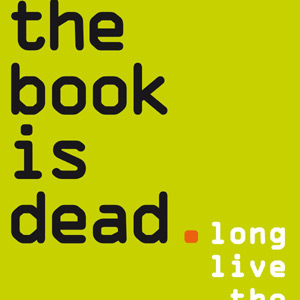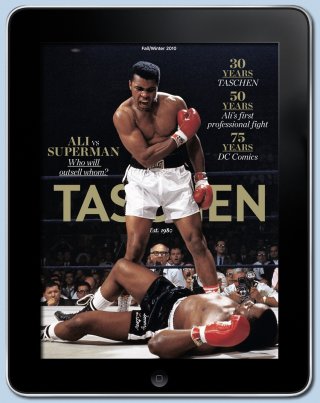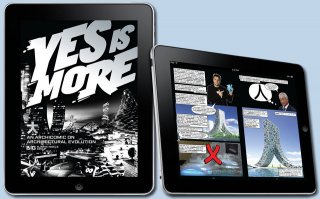
The Book Is Dead, theage.com.au
Although it is hard for many of us to emotionally detach ourselves from the book as an incredible medium, what with all its historical contributions to humanity, we must admit that the concept of the book as the best delivery system for knowledge and information is, in fact, dead.
We are moving toward an ever growing differentiation between the book as object versus content delivery system. As this occurs, we cannot ignore the fact that our lives have been shifting dramatically toward a digitalized experience. This shift is happening not just for the sake of technology; it is happening because we--as in, society--are changing, as is our behavior.
We continually push our creativity to invent an ever changing dynamic of how we deal with the things that surround around us. We are still taking pictures, writing letters, calling friends, watching TV and films, reading newspapers, magazines, and books, going to parties, walking on the beach, playing games, and so on. What has fundamentally changed, however, is how we do all these things. And what we are doing, precisely, is redesigning the experience of all the above, or at least how we go about doing them. This has been evident for some time, so there should no longer be reason for panic.
Our society has changed the focus from hardware to software, the main difference being that with software, there is (potentially) never a final product. It is always evolving, there is always something more to be done, and updating is a norm. Software is probably the only product we buy (or use), knowing that it actually doesn't do everything it promises. But it is usually the best product you can get for what you are trying to accomplish, and it will still help you anyway. When new features are added, you are usually happier. The pressure to deliver a final product in hardware, on the other hand, is enormous, and the chance to resell a better version is very limited for most products. Hardware, in the case of books, is acquiring a new function, primarily as an object, something to be enjoyed and treasured in a completely different way. This change in function and functionality is definitely not exclusive to books. If we look at how radios, television, magazines, and newspapers have changed over the last 50 years, it is a phenomenon. Having gone through the requisite evolutions, they're all still here.
When focusing on book publishing, however, which is something I have done for the last 10 years, the possibilities are many. In The Gutenberg Parenthesis, as pointed out by Professor Thomas Pettitt in Sweden, "Change is inevitable. It is all going to change whether the industry wants it or not, so we better embrace it in order to see the opportunities." For printed books, it means the return of craft, also a great opportunity for designers. The object will matter more and more. Paper, textures, special colors, formats, blocking, hot stamping, and all other things that are just possible in print will be explored at their best. The object should give you an incomparable experience, something the digital might never achieve. As far as digital goes, it is all changing very rapidly. In a few years, the notion of a publishing house will change dramatically. Self-publishing is becoming major, and as in music, the idea that you need a publisher to "be someone" out there is changing fast. A book that weights 20 pounds can offer an amazing visual and tactile experience (as pointed out previously), but you won't take it to your bed to read. It might have amazing texts written by top writers, but probably only 5% of the buyers are going to read them. This is where digital comes in.

Courtesy of TASCHEN
So we might end up with two versions of content delivery where one holds as much value as the other. They are just different. Some people might have both, but mostly, people will choose one, according to age, lifestyle, appreciation, taste, intent, accessibility, and other factors. Ultimately, we as an industry are all competing for people's time. And competition has become completely non-linear, meaning that the decision to go to a cafe, to buy a book, or to spend time on Facebook have the same importance, even though they are completely different things.
The challenge is also finding a new business model, and finding a way to finance it. Some sort of commerce, one way or the other, sooner or later, will always be the main way to support innovation. The models are many: single advertising, purchase, subscription, percentage of sales, pay-per-click, you name it. There are plenty of ways to finance things as long as the content is worth people's time. DIY is also a current. If we do not supply the market, someone else will. Users take the time to scan hundreds of pages, convert them to PDFs, create indexes, and post on file-sharing sites. If we do not do it (and do it much better), it's a missed opportunity. There is a pent-up demand out there and customers are hungry for that. The faster mobile devices get to the market, the more chances we have to succeed. As my friend Robbie Bush rightly defined to me, digital publishing these days is the wild west of media. It is a completely open territory. We now have the capability to completely redesign the experience of what we once knew as books. There is plenty of work to do, which is an exciting prospect for all designers, from those who favor the classic, beloved book to those who have moved on to the exciting new tablets. We are witnessing the rebirth of the book--let's enjoy it.

Courtesy of TASCHEN
=======
Julius Wiedemann is the Executive Editor for Design and Director for Digital Publications at TASCHEN, the leading publisher in the arts. The article was written on an iPad, on a flight from New York to Sofia, Bulgaria, where Wiedemann was going to meet developers of iPad Apps.